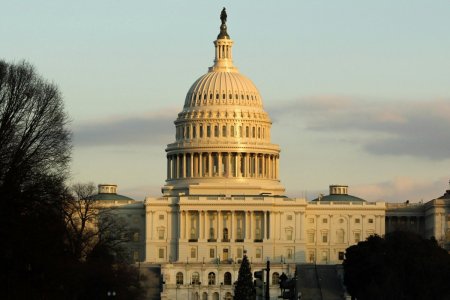New bill could put more cash in your pocket—Big changes for Social Security!
By
Aubrey Razon
- Replies 0
The House is pushing for changes that might fix problems affecting millions of workers. Stay tuned as we unpack how this could impact your retirement!
The first is the Government Pension Offset (GPO), which currently decreases spousal or widow(er) benefits for those who receive a pension from an employer that did not withhold Social Security taxes.
The second is the Windfall Elimination Provision (WEP), which can reduce Social Security benefits for individuals who also receive a pension or disability benefit from such employers.
To illustrate the impact of the GPO, consider this scenario: under the current system, an individual entitled to a $900 spousal benefit from Social Security, who also has a $1,000 non-covered pension, would see their Social Security benefit reduced by $667.
This leaves them with a mere $233 in spousal benefits.
If the GPO were repealed, as proposed by the Social Security Fairness Act, the individual would receive the full $900 spousal benefit without any offset.
With over 300 lawmakers, including House Speaker Mike Johnson, backing the bill, it reflects a robust consensus across party lines.
Additionally, organizations like the National Association of Counties have voiced support, citing the bill's potential to aid in recruiting workers amidst labor shortages.
Despite the broad support, the bill faced a procedural hurdle when leaders of the conservative House Freedom Caucus intervened, tabling part of the measure during a pro forma session.
This move by Rep. Andy Harris and former chair Rep. Bob Goode was seen as a response to the Congressional Budget Office's estimate that the bill would add approximately $196 billion to the federal deficit over ten years.
However, the bill's sponsors utilized a discharge petition—a rarely successful process—to bypass the committee stage and bring the bill directly to the House floor for a vote.
This change would be especially beneficial for older Americans who have worked in public service or other sectors where their pensions are not covered by Social Security.
The bill stipulates that the changes would be effective for benefits payable after December 2023, offering a brighter financial future for many.
Its fate in the Senate remains uncertain, but the wide margin of support in the House suggests that the bill has a fighting chance.
Should it clear both chambers of Congress, it would then be up to President Joe Biden to sign it into law.
 Have you or someone you know been affected by the GPO or WEP? What are your thoughts on the Social Security Fairness Act? Share your stories and opinions in the comments below.
Have you or someone you know been affected by the GPO or WEP? What are your thoughts on the Social Security Fairness Act? Share your stories and opinions in the comments below.
Understanding the Social Security Fairness Act
The Social Security Fairness Act targets two specific provisions that have historically reduced Social Security benefits for certain individuals.The first is the Government Pension Offset (GPO), which currently decreases spousal or widow(er) benefits for those who receive a pension from an employer that did not withhold Social Security taxes.
The second is the Windfall Elimination Provision (WEP), which can reduce Social Security benefits for individuals who also receive a pension or disability benefit from such employers.
To illustrate the impact of the GPO, consider this scenario: under the current system, an individual entitled to a $900 spousal benefit from Social Security, who also has a $1,000 non-covered pension, would see their Social Security benefit reduced by $667.
This leaves them with a mere $233 in spousal benefits.
If the GPO were repealed, as proposed by the Social Security Fairness Act, the individual would receive the full $900 spousal benefit without any offset.
Bipartisan Support and the Path Forward
Introduced by Republican Rep. Garrett Graves of Louisiana and Democrat Rep. Abigail Spanberger of Virginia, the Social Security Fairness Act has garnered significant bipartisan support.With over 300 lawmakers, including House Speaker Mike Johnson, backing the bill, it reflects a robust consensus across party lines.
Additionally, organizations like the National Association of Counties have voiced support, citing the bill's potential to aid in recruiting workers amidst labor shortages.
Despite the broad support, the bill faced a procedural hurdle when leaders of the conservative House Freedom Caucus intervened, tabling part of the measure during a pro forma session.
This move by Rep. Andy Harris and former chair Rep. Bob Goode was seen as a response to the Congressional Budget Office's estimate that the bill would add approximately $196 billion to the federal deficit over ten years.
However, the bill's sponsors utilized a discharge petition—a rarely successful process—to bypass the committee stage and bring the bill directly to the House floor for a vote.
What This Means for You
If the Social Security Fairness Act passes, it could mean a significant increase in the monthly benefits for those affected by the GPO and WEP.This change would be especially beneficial for older Americans who have worked in public service or other sectors where their pensions are not covered by Social Security.
The bill stipulates that the changes would be effective for benefits payable after December 2023, offering a brighter financial future for many.
The Next Steps
While the bill is expected to move forward with a House vote, it will now require a supermajority to pass due to the procedural setback.Its fate in the Senate remains uncertain, but the wide margin of support in the House suggests that the bill has a fighting chance.
Should it clear both chambers of Congress, it would then be up to President Joe Biden to sign it into law.
Key Takeaways
- The House is attempting to pass the Social Security Fairness Act, which aims to ensure benefits for workers with non-covered pensions.
- The Act seeks to repeal the government pensions offset (GPO) and windfall elimination provision (WEP) which currently reduce Social Security benefits for certain recipients.
- The legislation has bipartisan support and is backed by a significant number of lawmakers, as well as by groups such as the National Association of Counties.
- Although the conservative House Freedom Caucus has attempted to block the bill, it is expected to move forward with a House vote, though it now faces a tougher supermajority threshold for passage.







